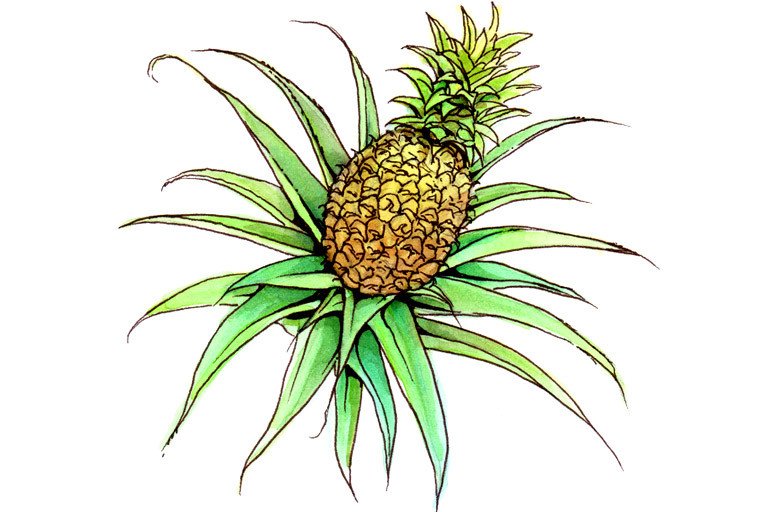
For Patients & Caregivers
Tell your healthcare providers about any dietary supplements you’re taking, such as herbs, vitamins, minerals, and natural or home remedies. This will help them manage your care and keep you safe.
Bromelain has anti-inflammatory properties, but has not been shown to treat or prevent cancer.
Bromelain is an enzyme that breaks down protein molecules and is obtained from pineapple stems. In lab experiments, bromelain prevented blood clotting and decreased inflammation.
Studies in humans are limited. When used topically in clinical settings, it helps remove dead and damaged tissue from burns. Although bromelain is sometimes taken orally to help digestion and absorption, studies are lacking. It also has not been studied for effects on cancer in humans.
Bromelain may increase the absorption of some antibiotics.
-
To treat arthritis
Lab studies suggest bromelain can reduce inflammation, but results from clinical trials are mixed. -
To treat skin burns
Studies in humans support this use in clinical settings. -
To prevent and treat cancer
Lab studies suggest bromelain has anticancer activities, but these effects have not been studied in humans. -
To improve circulation
Lab studies suggest that bromelain can prevent blood clots, but there is no proof from clinical trials that it can treat circulatory disorders. -
To reduce swelling
Small clinical studies suggest that bromelain helps reduce swelling.
Allergic reactions have been reported.
Do Not Take if:
- You are taking warfarin or other blood thinners: Preclinical studies suggest bromelain may increase the risk of bruising and bleeding.
- You are taking tetracycline antibiotics: Bromelain may increase blood and urine levels of these drugs.
Special Point:
Bromelain may increase blood levels of antibiotics by increasing their absorption in the intestine.
For Healthcare Professionals
Bromelain is a proteolytic enzyme obtained from pineapple stems that has a range of applications. Preclinical data suggest it has anti-inflammatory properties (15) (16), reduces serum fibrinogen levels, supports fibrinolysis, and has debriding effects on burn wounds (1).
Clinical findings reported safety and effectiveness of a bromelain-based product for burn (28) and chronic wound (33) debridement although a case series suggests it may not be useful for diabetic foot burns (32). Other small studies suggest benefit for treating specific skin conditions (2), improving acute knee pain (3), and for alleviating postoperative pain, swelling and bleeding (27) (29) (30) (34). However, data on whether it can reduce inflammation (35) or relieve arthritis pain are mixed (4) (5) (6), and it does not appear to reduce fibrinogen or influence other cardiovascular disease risk factors (31).
Bromelain demonstrated chemopreventive (19) (25) and antitumorigenic effects (10) (20) (26) in preclinical studies. A formulation of alpha-Lipoic acid, Boswellia serrata, methylsulfonylmethane and bromelain improved symptoms of aromatase inhibitor-associated arthralgia in early breast cancer postmenopausal patients (36). A case report of prostate cancer patients found adjunctive use of bromelain with immunotherapy reduced PSA levels and stabilized the disease (37). Well-designed randomized trials are needed to evaluate the anticancer potential of bromelain.
Pineapple
- Arthritis
- Burns
- Cancer
- Circulation
- Swelling
Proteolytic removal of cell surface molecules by bromelain may account for some of its activities. Preclinical studies suggest it prevents platelet aggregation and adhesion to blood vessel endothelial cells (13). Anti-inflammatory effects are attributed to reduced levels of prostaglandin E2 and thromboxane A2 (9). In addition, bromelain inhibits neutrophil migration in response to IL-8 during inflammation (14) and decreases pro-inflammatory chemokine and cytokine secretion (15) (16).
Oral enzymes such as bromelain have been proposed as additive agents for cancer therapy (8). Proposed mechanisms include downregulation of the immunosuppressive cytokine TGF-beta (7), direct inhibition of tumor cell growth, modulation of immune cell function and cell adhesion molecules, and the effects on platelet aggregation and thrombosis mentioned above (8) (9). Experiments with murine models suggest bromelain induces apoptosis-related proteins and inhibits NF-kappaB-driven Cox-2 expression by blocking MAPK and Akt/protein kinase B signaling (20). Bromelain also induced expression of autophagy-related proteins, light chain 3 protein B II, and beclin-1, thereby facilitating apoptosis in mammary carcinoma cells (26).
CYP450 2C9: In vitro studies suggest bromelain inhibits CYP2C9 activity and may affect the metabolism of substrate drugs (12). Clinical relevance has yet to be determined.
Antibiotics/tetracyclines: Bromelain may increase blood and urine levels of these drugs (23).
Anticoagulants: Preclinical studies suggest bromelain may increase bleeding risk due to its antithrombotic effects (24). Clinical relevance has yet to be determined.